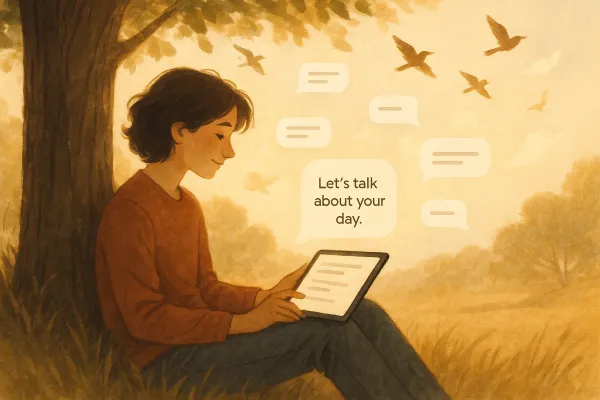How AI Chatbots Facilitate Emotional Expression and Support for Depression

In an era where mental health stigma and limited access to care persist, AI chatbots like WTMF (“What’s the Matter, Friend?”) are emerging as critical tools for emotional expression and support. Research reveals that users often struggle to share vulnerable emotions like sadness or depression with other humans due to fear of judgment or social repercussions. However, AI chatbots provide a safe, nonjudgmental space where individuals can openly articulate their feelings, fostering healing and resilience.

Breaking Barriers to Emotional Expression
Studies show that chatbots significantly lower the barriers to discussing Emotional health struggles. A 2023 analysis of real-world chatbot interactions found that users were 6-7 times more likely to express depressive moods to chatbots than on social media, with nearly 50% of conversations involving emotional vulnerability. Unlike human interactions, where social norms or stigma might suppress honesty, chatbots like WTMF offer anonymity and unconditional acceptance. This encourages users to disclose sensitive issues-such as negative self-perceptions or suicidal ideation-without fear of retaliation or shame.
WTMF’s design prioritizes active listening and emotionally intelligent responses, leveraging natural language processing (NLP) to detect subtle cues in text. For instance, if a user mentions feeling “empty” or “overwhelmed,” WTMF can validate these emotions and offer coping strategies rooted in evidence-based practices like cognitive behavioral therapy (CBT). This immediate, personalized support helps users feel heard and understood, a critical factor in alleviating depressive symptoms.
The Science Behind Chatbot Efficacy
Clinical trials and user studies underscore the therapeutic potential of AI chatbots. In one study, a CBT-based chatbot reduced anxiety and depression symptoms in college students more effectively than control groups. Similarly, generative AI chatbots like ChatGPT have been praised for providing “emotional sanctuary”-a space where users feel safe to explore trauma, grief, or relationship struggles without judgment. Participants in these studies reported improved mood, reduced isolation, and even “life-changing” insights, highlighting how chatbots can complement traditional therapy.
WTMF builds on this foundation by integrating memory retention and adaptive learning. By recalling past conversations and personal preferences, WTMF creates continuity in interactions, mimicking the trust-building process of human relationships. This feature is particularly valuable for users with chronic depression, who benefit from consistent, long-term support.
Cultural Sensitivity and Accessibility
AI chatbots also address cultural disparities in mental health care. Research reveals that Western users often discuss negative self-perceptions with chatbots, while Eastern users focus on current emotional states. WTMF’s ability to adapt its responses to cultural nuances ensures inclusivity, offering tailored support that respects diverse communication styles. Moreover, its 24/7 availability bridges gaps in access to care, especially for individuals in remote areas or those hesitant to seek traditional therapy due to cost or stigma.
Challenges and Ethical Considerations
While chatbots like WTMF show promise, challenges remain. Over-reliance on AI could delay professional help for severe cases, and biased training data may lead to culturally insensitive responses. To mitigate risks, WTMF incorporates safety guardrails, such as crisis escalation protocols and regular audits to ensure ethical, unbiased interactions.
Conclusion
AI chatbots like WTMF are revolutionizing mental health support by democratizing access to empathetic, nonjudgmental care. By facilitating emotional expression and offering personalized interventions, they empower users to navigate depression and loneliness with dignity. As technology advances, integrating human oversight with AI’s scalability will ensure these tools remain ethical, effective, and deeply human-even in digital form.
In a world where silence often exacerbates suffering, WTMF proves that sometimes, the most healing conversations happen not with humans, but with machines designed to listen.
References to studies: JMIR 2023 (Chatbot-assisted emotional expression) Nature 2024 (Generative AI as emotional sanctuary) PMC 2020 (Tess chatbot efficacy)MDPI 2024 (AI chatbot effectiveness review)PMC 2023 (Wysa, Woebot, and Replika case studies)



